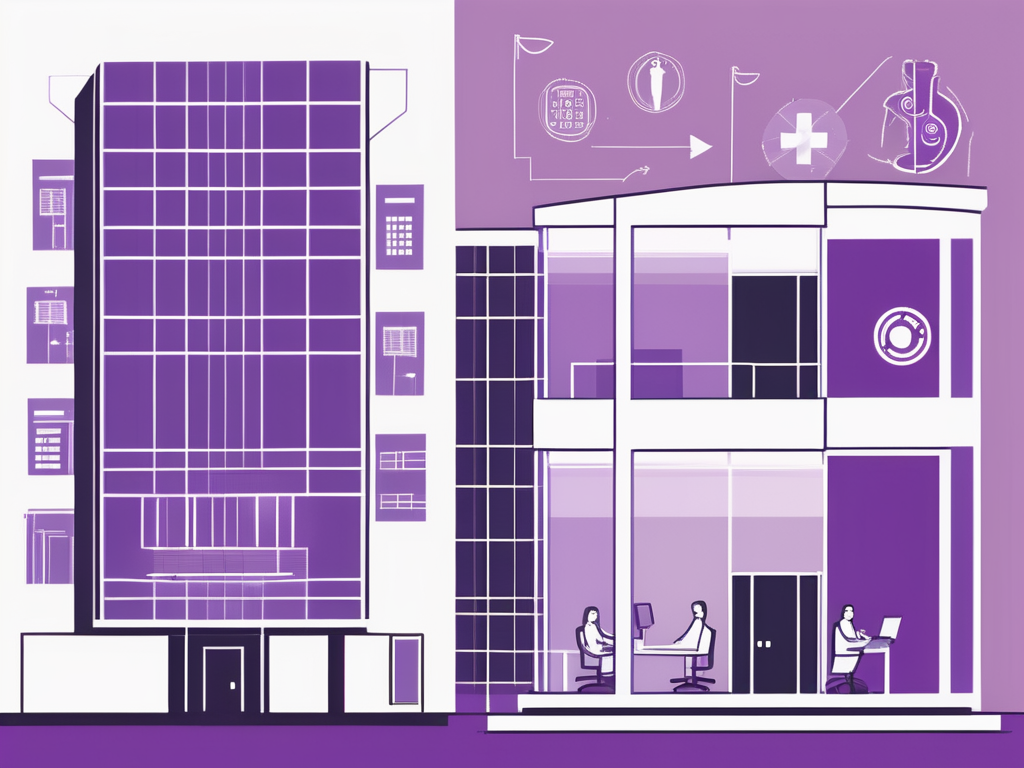In-House vs. BPO Healthcare Operations
03 May 2024 By: Maria De Jesus
Updated
Healthcare providers must decide between managing operations themselves or outsourcing to a BPO partner for specialized healthcare support services. Both options have pros and cons. This article compares in-house and BPO healthcare operations, highlights their benefits, and discusses their differences. We will also offer tips to help you choose the best option for your organization’s future.

Understanding In-House Healthcare Operations
When healthcare operations are managed in-house, providers control all operation aspects. This includes staffing, training, technology, process design, and quality assurance. In-house management allows for direct oversight of services, offering flexibility and customization for patient needs.
But what are in-house healthcare operations? Let’s examine the key features that make this model unique and effective.
Key Features of In-House Healthcare Operations
In-house healthcare operations mean the organization hires its healthcare and administrative staff. This model builds unity, camaraderie, and familiarity within the team. It enhances collaboration and communication across departments, improving service delivery and patient care.
Picture a healthcare facility where doctors, nurses, and staff work together, sharing expertise to deliver top care. Here, everyone shares the same goal: patient well-being. This unity boosts care quality and fosters a positive work culture.
Pros and Cons of In-House Healthcare Operations
One major benefit of in-house healthcare operations is control. Organizations can make decisions that align with their goals and values, ensuring consistent quality of care.
In-house operations allow providers to tailor services to patient needs. They can adopt new technologies, streamline processes, or provide specialized treatments, offering flexibility and adaptability.
However, in-house operations have high overhead costs. Investment in infrastructure, technology, training, and staffing can be financially demanding. Managing an in-house team also requires time, possibly distracting from primary healthcare duties, making healthcare BPO services an attractive solution.
Despite these challenges, many find the advantages of in-house operations significant. Complete control over operations ensures high care standards and a patient-focused environment, promoting trust and satisfaction.
Exploring BPO Healthcare Operations
BPO healthcare operations mean outsourcing non-core tasks to specialized companies. These tasks include medical coding, billing, claims processing, customer service, and back-office support. By using a BPO partner, healthcare organizations can concentrate on their main functions and delegate operational duties to a dedicated team.
Defining BPO in Healthcare
Business Process Outsourcing (BPO) in healthcare involves delegating non-core tasks to external providers. BPO companies bring expertise, scale, and advanced technology, enhancing efficiency and productivity. This helps healthcare organizations streamline operations and optimize resource use.
Advantages and Disadvantages of BPO Healthcare Operations
One main advantage of BPO in healthcare is cost reduction. Outsourcing cuts labor, infrastructure, and technology costs. BPO companies offer specialized expertise, boosting accuracy and speeding up processes like medical coding and claims.
BPO also broadens access to skilled professionals aware of latest trends and regulations, enhancing compliance and performance.
However, outsourcing raises concerns about patient data security. Establishing strong data protection and ensuring the BPO adheres to security measures is crucial. Outsourcing also means less control over some operations, a potential downside for those wanting full autonomy.
Despite these issues, the benefits of BPO often outweigh the drawbacks. By using a specialized provider, healthcare organizations can optimize operations, cut costs, and boost efficiency. It’s vital for healthcare providers to select the right BPO partner and maintain open communication for a successful partnership.
Trending Now
As healthcare organizations face tight operating margins, Deloitte notes a trend towards outsourcing, especially in non-core functions like revenue cycle management and billing. Tina Wheeler from Deloitte emphasizes that this shift aims not just to cut costs but to strategically optimize resources. With financial strains from rising labor costs and higher interest rates, many health systems are turning to offshoring back-office tasks to slash expenses, sometimes by up to 50% for large systems.
However, outsourcing can bring challenges such as potential quality issues and backlash from local communities, particularly in areas where hospitals are key employers. Deloitte advises a careful balance in outsourcing decisions to preserve service quality and maintain good community relations.
Key Differences Between In-House and BPO Healthcare Operations
Several key differences exist between in-house and BPO healthcare operations, crucial for choosing the best option for your organization.
In-house operations can struggle with scalability, finding it hard to adjust quickly to changing demands. BPO providers, however, often have the resources and expertise to scale operations up or down efficiently, accommodating fluctuating workloads effectively.
Operational Differences
In-house operations provide more control and customization, with decisions made internally and staff working closely for seamless coordination. Conversely, BPO involves external parties and standardized processes, possibly limiting flexibility but offering specialized expertise.
Additionally, in-house operations can enhance employee loyalty and retention, deepening understanding of organizational goals. However, BPO can introduce fresh perspectives and innovative approaches due to their experience with diverse clients and industries.
Cost Implications
In-house operations often require substantial initial investments in infrastructure, technology, and staffing. On the other hand, BPO operations can lead to cost savings through economies of scale and access to specialized services. It’s vital to carefully review pricing structures and agreements for long-term financial health.
Cost considerations go beyond money and include risk management and compliance. In-house operations need ongoing monitoring and investment to keep up with regulations. BPO providers can manage some of the compliance, letting healthcare organizations concentrate on core activities.
Quality of Service Comparison
In-house operations may offer more consistent service quality due to direct management and strict quality controls. BPO operations, backed by service level agreements (SLAs), ensure performance standards. However, aligning with organizational values and culture demands careful selection of BPO partners.
Quality also depends on adapting to changing patient needs and industry trends. In-house operations often better customize services for specific patient groups. Conversely, BPO providers can apply best practices and innovations from their experience with multiple clients to enhance healthcare delivery.
You may want to explore these related articles…
Answering Service for Doctors Office
The Role of BPO in Enhancing Patient Engagement Software
HIPAA compliant answering service
Making the Decision: In-House or BPO?
When deciding between in-house and BPO healthcare operations, consider several key factors.
A crucial factor is the level of control you want over operations. In-house operations give direct control, enabling customization and quick responses to changes in healthcare outsourcing needs. BPO operations, however, bring specialized expertise and efficiency, though they often involve giving up some control over operations.
Factors to Consider
When choosing between in-house and BPO healthcare operations, consider organizational goals, financial resources, required expertise, and scalability. Also, factor in data security, risk management, and regulatory compliance. This includes HIPAA and Business Associate Agreement (BAA) for outsourcing.
Another key aspect is innovation and technological advancement. In-house operations may allow for developing new technologies and processes suited to specific needs. In contrast, BPO providers often invest in cutting-edge technologies and best practices, boosting operational efficiency and effectiveness.
Impact on Healthcare Delivery
Choosing between in-house or BPO operations impacts healthcare service delivery. Organizations need to assess how each option affects patient care now and in the future. Consider the continuity of care, patient satisfaction, and service accessibility within your operational model.
Additionally, your choice influences geographical reach and market presence. In-house operations might restrict expansion due to resource limits, whereas BPO operations can expand your talent pool and geographical footprint, aiding in growth and expansion.
Long-Term Implications and Sustainability
The sustainability and long-term implications of your chosen operational model are critical. You must plan carefully, evaluate, and monitor performance metrics to align with your organization’s strategic and financial goals.
Also, consider the impact on organizational culture and employee morale. In-house operations often build employee ownership and loyalty. In contrast, BPO operations might raise job security concerns and affect organizational identity. Balancing these aspects is vital for a positive work environment and retaining top talent.
Future Trends in Healthcare Operations
As healthcare operations evolve, several key trends are reshaping service delivery and transforming the industry. These developments are crucial for adapting to future healthcare challenges and opportunities.
The Role of Technology
Technology advancements are transforming healthcare operations. Electronic health records (EHRs), telehealth, and artificial intelligence (AI) are key players. EHRs provide quick, secure access to patient info, enhancing diagnosis and treatment accuracy. Telehealth allows remote consultations, reducing in-person visits and broadening access to care. AI, including machine learning, analyzes large data sets to predict health outcomes, offering personalized and proactive care.
Regulatory Changes and Their Impact
The healthcare industry faces strict regulations, and changes in these can deeply affect operations. Providers must remain vigilant and adaptable, continuously training and engaging with regulatory bodies to ensure compliance. Regulatory shifts also offer chances for innovation, like electronic prescribing systems, which not only increase medication safety but also streamline processes, cut errors, and boost efficiency.
The Evolving Healthcare Landscape
The healthcare landscape is rapidly changing due to demographic shifts, evolving patient expectations, and new health challenges. Providers need to anticipate and adapt to these changes to deliver top-quality, patient-focused care. This involves innovation, collaboration, and flexibility. For instance, many healthcare organizations are now partnering with community groups and social services to tackle social determinants of health like housing and food security, which can enhance health outcomes and lower costs.
Moreover, the COVID-19 pandemic has spurred the growth of virtual care and underscored the need for preparedness and resilience in healthcare. Highlighting the importance of healthcare BPO services for emergency plans. Providers are investing in strong telehealth systems, remote monitoring technologies, and emergency plans. This is to maintain care continuity during crises, often facilitated by healthcare BPO partnerships.
Conclusion
The decision between in-house and BPO healthcare operations hinges on each organization’s specific needs and goals. By assessing crucial aspects like control, cost, quality, and sustainability, healthcare providers can make an informed choice that supports their vision for excellent patient care delivery.
“We are entering a world, where the only legitimate borders for work are skill boundaries”
― Gyan Nagpal
As you weigh the options between in-house and BPO healthcare operations, consider the efficiency and expertise that HelpSquad BPO can bring to your organization. Our bilingual virtual assistants and 24/7 customer service team are ready to enhance your operations, starting at just $8.50 per hour. Embrace the future of healthcare with HelpSquad BPO’s professional outsourcing services. Start Trial today and experience the difference we can make.
Related Blogs
 22 Jul
22 Jul Business Process Outsourcing
The Pros and Cons of Outsourcing
Outsourcing helps businesses get extra help for their tasks. It has ups and downs. Knowing these helps businesses make smart choices. This article will break down what outsourcing means and how it’s evolved. We’ll explore its good and bad sides, giving you a clear picture of what to expect. Plus, we’ll share tips on what … Continued
 16 Jul
16 Jul Business Process Outsourcing
What is Great Customer Service?
Customer service is vital for business success, building strong relationships and ensuring satisfaction. This article explores what makes great customer service stand out, offering strategies to enhance service quality and measure its effectiveness. Understanding the Basics Defining Customer Service Before we explore great customer service, let’s define it. Customer service means helping customers before, during, … Continued
 15 Jul
15 Jul Business Process Outsourcing
How a Strong Customer Experience Strategy Fuels Success
In today’s competitive world, a strong customer experience strategy is vital. Focusing on customers and aligning business goals with their needs is key. Measuring the impact of customer experience and overcoming implementation challenges is crucial for staying ahead. Technology will continue to enhance customer experience, bringing exciting developments. Let’s dive into these topics. Understanding the … Continued